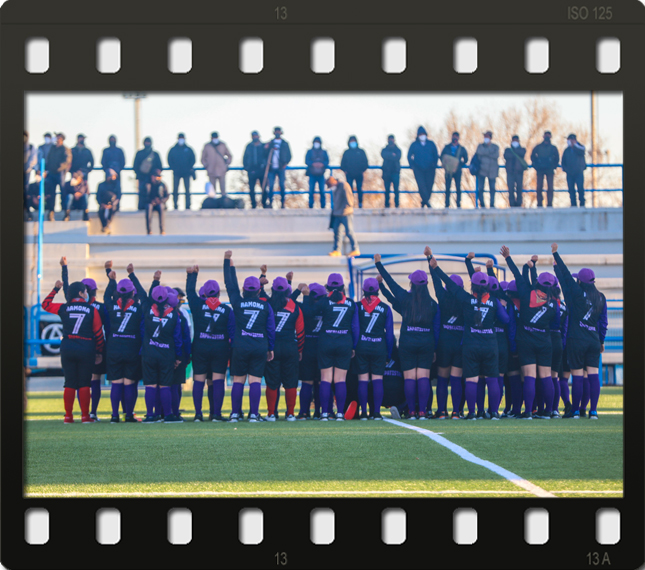Two Zapatista delegations of Maya descent visited Europe this 2021, and dedicated the majority of their journey to listening, and sharing words and experiences in intimacy. Here are some notes.
Text and photos by: Daliri Oropeza

We believe the conscious, organized struggle undertaken by a colonized people in order to restore national sovereignty constitutes the greatest cultural manifestation that exists.
—Frantz Fanon in The Wretched of the Earth
The first stage of the Journey for Life called by the Zapatista Army of National Liberation ended in Madrid, with the return of the second delegation — La Extemporanea, who had traversed, as if weaving a vast spiderweb, three zones of the territory with teams of listening and the word.
At a time in which there are media platforms upon which parties and personalities make policy, we hear barbarities like “indigenism is the new communism. And in an advanced democracy there is not even space to question history, nor truth, nor national unity,” as the president of the Community of Madrid, Isabel Díaz Ayuso said to the Board of Directors of the United States Chamber of Commerce in Spain.
In this over-mediatized politics, the left struggles with the more-left while the fascist right advances aggressively all over the world. There is an atmosphere of scandal and polarization in things said by politicians and rulers in the face of vacuous right-wingers and illiterate media audiences that believe in fake news.
It is here that the Zapatista journey inserts itself, first with the silence of the maritime delegation Squadron 421, that was a mirror for the movements in the territory that they renamed as Slumil K’ajxemk’op. The delegation also reflected that history can be navigated differently to broaden horizons:
“We are taking the [same] course as the one taken 500 years ago, in this case we take this course to sow life, and unlike 500 years ago, it is the opposite,” said subcomandante Moíses when Squadron 421 left Isla Mujeres, on the boat La Montaña.
With the work of weaving listening and the word, La Extemporanea arrived in Europe. It [the delegation] participated in a few public events during the Journey: the reception, the climate strike, the protest in front of the embassy in Vienna, for the two kidnapped Zapatistas, the protest on the river of Berlin, the altar for the Day of the Dead in Barcelona, and the farewell soccer game in Madrid.
La Extemporanea discreetly distanced itself from the political noise. The Zapatistas bet on intimate gatherings, without media, photos, recordings, and without journalists — only dialogue, sharing of knowledge and resistances, notes and meals. Ground-level strolls that rescreen the cement of the civilizational stories that we have been told. What the Zapatistas and the collectives said stays with those who participated. It goes underground.
As the Zapatista delegation, made up of 177 people moved through, a fabric of exchange of realities resonated with the intention of understanding how all of us are tread upon by capitalism. A fabric that is invisible, porous, and is made through the exchange of languages, unique cultures, in sharing experiences, clothing styles, in asking questions, making foods, in seeing each other in the differences, in what angers us, and in the ways that we arrive at consensus.
What forms does this fabric take? The Zapatista women and men affirmed that they brought a seed, and what grows from that seed has yet to take shape. What remains clear is that the condition of Mother Earth, of the planet and life only becomes worse with capitalism.
That invisible fabric was evident during the soccer match between the Zapatista team, Ixchel Ramona against the Independiente de Vallekas. It is in the resonance, in the creativity, in the participation and in the activism of European non-binary, women and men, that have the possibility of forming an alliance. They are people from more than 13 countries that have coexisted for more than a year, since the EZLN announced that it would make the Journey for Life.
In the sharing, the companionship, the sorrows, the rage, the militance, the constancy, and the listening they find a thread, and in that thread the potential for moving into action, into the organization of an Insubordinate Europe, as the other Europe has been named, the Europe that does not surrender. It is now time to recall what happened, and to make a historical memory so that the narrative of the process is not lost, and to reflect on the horizon.
From the beginning of the tour, the Zapatistas announced that it would be a journey to the five continents, to share the knowledge of what they have put into action since the uprising and their history as tseltal, tsotsil, chol, tojolabal and mam peoples.
With this Journey, they leave one of the many seeds that they have sown in different ways and times to create invisible fabrics of resistances, horizons, and hopes in the face of this fucked-up world.
In Black Skin, White Masks, Frantz Fanon (we are remembering him 60 years after his death) he concludes:
“It is through self-consciousness and renunciation, through a permanent tension of his freedom, that man can create the ideal conditions of existence for a human world.
Superiority? Inferiority?
Why not simply try to touch the other, feel the other, discover each other?”
Goal!!
This article was published in Pie de Pagina on December 7th, 2021. https://piedepagina.mx/el-tejido-invisible/ English interpretation by Schools for Chiapas.
